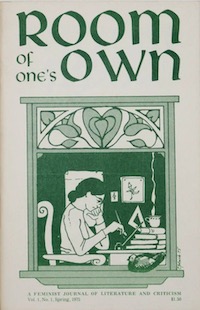ROOM 1.1
Spring 1975
Digital only; out of stock in print.
Virginia Woolf, one of our most distinguished novelists and critics, was the first to explain the lack of a strong female tradition in literature. In her now-famous essay of 1928, she asserted that “A woman must have money and a room of her own if she is to write. Since women have been forced by custom and by law into financial dependence upon fathers and husbands, few ever acquired the freedom or the privacy necessary for artistic achievement. Working class women had a further handicap: they were so busy trying to make ends meet and caring for their large families that they seldom had any time at all for themselves. Privacy and free time were luxuries denied to all but a very small minority of women.
As a result, early women writers produced a few literary works of major significance. And the absence of a female tradition in literature was itself a deterrent to the development of such a tradition. Woolf points out that even such authors as the Brontes and Marian Evans published their novels under male pseudonyms. Without feminist writers to serve as models, and lacking the self-confidence to devise disti^tive modes of expression, most women who wrote at all conformed to over- « whelmingly male conventions and stereotypes.
Although the problems of the female artist in the male- dominated culture have not yet been resolved, a tradition of women in literature is developing at last. Women writers, encouraged by the women’s movement of this century, are now insisting upon the validity of their feminist perceptions. Determined to tell their stories in their own ways, women of every economic and social class are turning out literature of every kind. Women writers once considered eccentrics now command respect for their role in society, as well as for their individual artistic achievements.
But the actual literary process, difficult and important as it is, is only a first step. Once she has arranged a time and a place to write, the beginning author wants to feel that other people will be interested in her finished work. Access to publication is absolutely essential if a writer is to develop her skills and her confidence.
The woman writer needs not only a private place in which to create but also “room” in publications where she can communicate her ideas and feelings to others. We of The Growing Room Collective hope that Room of One’s Own will serve as a forum in which women can share and express their unique persepctives on themselves, each other, and the world.

$10.00
Additional information
| Delivery | Canada, USA, International, Digital |
|---|
In this issue: Vera B. Williams, Dorothy Livesay, Elspeth Strang, Myra MacFarlane, Maureen McCarthy, Cynthia Flood, Cam Hubert, Nancy Thayer, Wiesa Kujawa-Scott, Leslee Silverman, Stephanie Judy, Vibeke Ohm, Gwen Hauser, Marge Piercy, Joan Haggerty